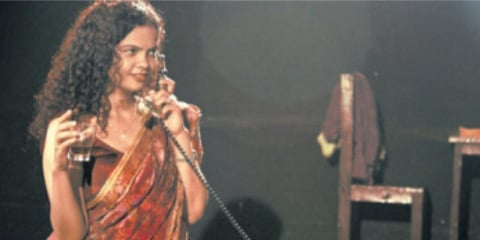

Indian writer Vijay Tendulkar is considered one of the best-known playwrights in modern Indian theatre. His works have often played a key role in bringing to light issues of social importance. Despite writing primarily in Marathi, his work has a sense of universality to it, and that is what makes him an influential literary icon. His plays have managed to embrace disconcerting subjects with utmost comfort. Inspired by this quality of Tendulkar’s plays, Nigam Productions have adapted Gidhade (translates to Giddh in Hindi and The Vultures in English), a 1961 play by Tendulkar that follows the story of a middle-class family. The play was performed on Saturday evening at Studio Safdar in West Delhi.
“People do not want [to watch] dark themes. However, my aim was to present this play in an entertaining way. We have created a family drama and it contains bits that are actually relatable to us,” shared director Swapnil Chitransh (26).
This is the first play produced by Nigam Productions. “Many people told us that this [play] will get banned. But we overlooked that and went forward with the process anyway. The response, too, has been great,” said Shubham Nigam, producer at Nigam Productions.
Exploring dark subjects
Giddh seeks to highlight the brutal realities of our time and showcases the fundamental evil that is inherent in most of us.
The adaptation by Chitransh solely focused on the language and conduct of the characters, which is an uncomfortable spectacle from the start. An ardent attempt has been made to match the dismay and chaos that is outlined in the original script. Key to the performance is the judicious usage of space; it creates a seamless, almost cinematic experience.
The background score Ye Katha, even though repetitive, blended well with the themes explored, thus amplifying the distressing course of events. This play—it’s almost 120-minutes—lacked coherence in transitions. The blackouts, which occur a number of times, were slow. Nonetheless, every time the characters made an entry, they provoked interest, keeping the audience engrossed. Powerful performances were exhibited, thus upholding the spirit of the story it was trying to communicate.
“While we have changed our play to make it relatable to contemporary audiences, ours is set in the 1970s as well, since we wanted to explain how the problems that existed then also exist today. To create an archaic atmosphere, we have added props like a gramophone and a landline telephone that was used in the 50s,” mentioned Chitransh.
This team, which has performed the play thrice, managed to keep the essence intact on Saturday. Shikha Patwa, who joined the play from Shakti Nagar, shared, “The themes explored in this play are very true; they actually exist in our society. These are seen around us, and the play did a great job in exploring the same.”
The play kept escalating discomfort for the viewers. But, in that discomfort lay the charm.